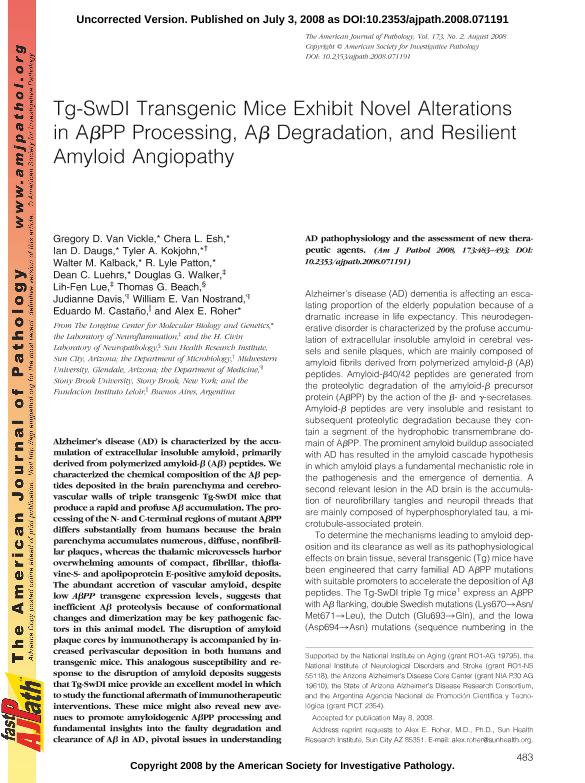Artículo
Tg-SwDI transgenic mice exhibit novel alterations in AbetaPP processing, Abeta degradation, and resilient amyloid angiopathy
Van Vickle, Gregory D.; Esh, Chera L.; Daugs, Ian D.; Kokjohn, Tyler A.; Kalback, Walter M.; Patton, R. Lyle; Luehrs, Dean C.; Walker, Douglas G.; Lue, Lih-Fen; Beach, Thomas G.; Davis, Judianne; Van Nostrand, William E.; Castaño, Eduardo Miguel ; Roher, Alex E.
; Roher, Alex E.
 ; Roher, Alex E.
; Roher, Alex E.
Fecha de publicación:
08/2008
Editorial:
Amer Soc Investigative Pathology, Inc
Revista:
American Journal Of Pathology
ISSN:
0002-9440
e-ISSN:
1525-2191
Idioma:
Inglés
Tipo de recurso:
Artículo publicado
Clasificación temática:
Resumen
Alzheimer's disease (AD) is characterized by the accumulation of extracellular insoluble amyloid, primarily derived from polymerized amyloid-beta (Abeta) peptides. We characterized the chemical composition of the Abeta peptides deposited in the brain parenchyma and cerebrovascular walls of triple transgenic Tg-SwDI mice that produce a rapid and profuse Abeta accumulation. The processing of the N- and C-terminal regions of mutant AbetaPP differs substantially from humans because the brain parenchyma accumulates numerous, diffuse, nonfibrillar plaques, whereas the thalamic microvessels harbor overwhelming amounts of compact, fibrillar, thioflavine-S- and apolipoprotein E-positive amyloid deposits. The abundant accretion of vascular amyloid, despite low AbetaPP transgene expression levels, suggests that inefficient Abeta proteolysis because of conformational changes and dimerization may be key pathogenic factors in this animal model. The disruption of amyloid plaque cores by immunotherapy is accompanied by increased perivascular deposition in both humans and transgenic mice. This analogous susceptibility and response to the disruption of amyloid deposits suggests that Tg-SwDI mice provide an excellent model in which to study the functional aftermath of immunotherapeutic interventions. These mice might also reveal new avenues to promote amyloidogenic AbetaPP processing and fundamental insights into the faulty degradation and clearance of Abeta in AD, pivotal issues in understanding AD pathophysiology and the assessment of new therapeutic agents.
Palabras clave:
Cerebrovascular Amyloidosis
,
Transgenic Mice
,
Swedish-Dutch Mutation
Archivos asociados
Licencia
Identificadores
Colecciones
Articulos(IIBBA)
Articulos de INST.DE INVEST.BIOQUIMICAS DE BS.AS(I)
Articulos de INST.DE INVEST.BIOQUIMICAS DE BS.AS(I)
Citación
Van Vickle, Gregory D.; Esh, Chera L.; Daugs, Ian D.; Kokjohn, Tyler A.; Kalback, Walter M.; et al.; Tg-SwDI transgenic mice exhibit novel alterations in AbetaPP processing, Abeta degradation, and resilient amyloid angiopathy; Amer Soc Investigative Pathology, Inc; American Journal Of Pathology; 173; 2; 8-2008; 483-493
Compartir
Altmétricas



